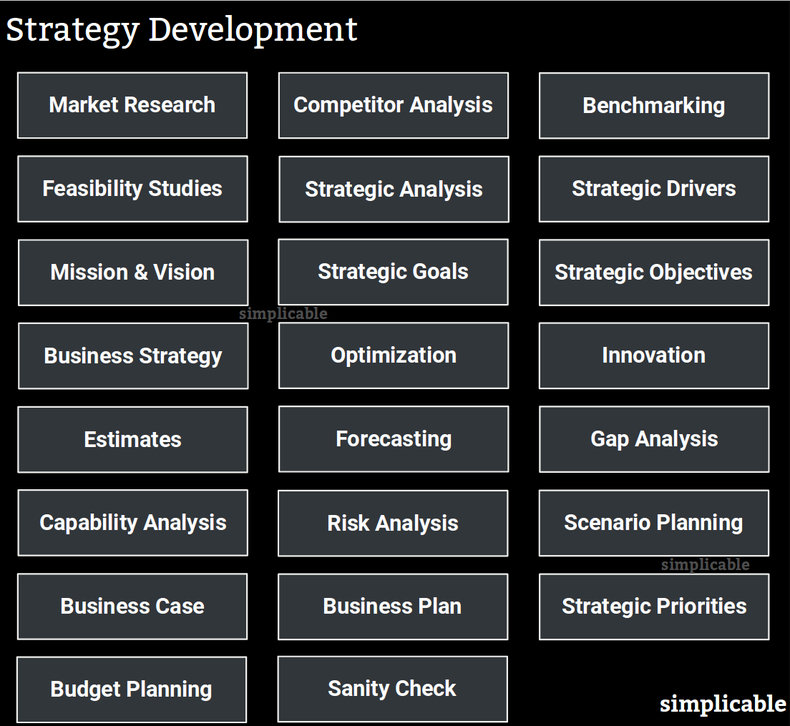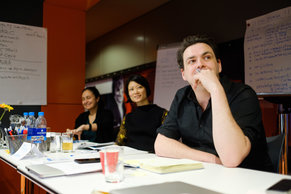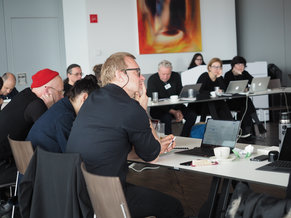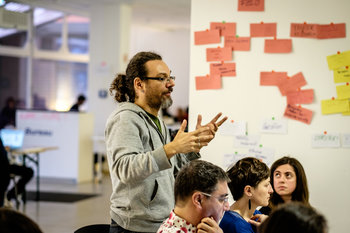
Market Research
Developing knowledge and data related to customers and markets. For example, a convenience store chain that identifies potential store locations that are high traffic and far from the competition.Competitor Analysis
Analysis of specific competitors. For example, a solar panel manufacturer that develops an estimate of a competitor's unit cost from their public financial results.Benchmarking
Benchmarking is the process of measuring your organization against an industry or competitor. For example, measuring your customer acquisition cost versus an industry average.Feasibility Studies
Investigating if an idea is realistic. For example, an airline that investigates if it would be possible to secure gates at a foreign airport as basic due diligence for a strategy proposal.Strategic Analysis
Strategic analysis is research aimed at understanding strategic strengths, weaknesses, opportunities and threats.Strategic Drivers
Identification and analysis of drivers that influence your strategy in areas such as competition, markets, regulations, public opinion, constraints, technology, customer needs and perceptions.Mission & Vision
Developing conviction around your mission as an organization and vision for the future. Your mission can be continually challenged but seldom changes if it is designed correctly. For example, "supply the energy needs of the nation" is better than "supply the oil needs of the nation" as the later makes the questionable assumption that a particular approach will remain dominant.Strategic Goals
Developing targets for the future. For example, a target to become the market leader in a particular product category.Strategic Objectives
Strategic objectives are measurable and meaningful steps towards strategic goals. For example, a goal to achieve 20% market penetration in a product category.Business Strategy
A business strategy is a concrete plan to achieve a goal in an environment of constraint and competition. For example, a plan to scale out production to reduce unit cost to gain a cost advantage over the competition.Optimization
Experimenting with small changes that can be predicted to have a benefit.Innovation
Innovation is the process of aggressively testing brave ideas. This may often fail. However, business experiments can be designed to fail well meaning that they fail safe, quick and cheap.Estimates
Estimating the cost, resource requirements and schedule for strategic options.Forecasting
Forecasting market conditions and the results of strategy.Gap Analysis
An identification of the gaps between where you are now and where you want to be. For example, a list of the major steps required to scale up production.Capability Analysis
Capability analysis is the practice of identifying your current and future business capabilities and the gap between. For example, a restaurant that looks at capabilities such as quality control to achieve a goal to increase customer satisfaction.Risk Analysis
The identification and analysis of risks associated with each strategic option.Scenario Planning
Scenario planning is the practice of considering possible future outcomes and how you will adapt strategy to each. For example, planning for both unexpectedly high and unexpectedly low demand for a product.Business Case
A proposal that outlines the benefits and risks of an investment. Used to pitch a strategy.Business Plan
A business plan outlines the benefits and risks of a new business. Used to pitch strategies to start, acquire or enter a new business.Strategic Priorities
A healthy business develops far more strategies than could possibly be implemented. This requires prioritization that is often based on evaluation of business cases.Budget Planning
The process of planning spending for a period of time including CAPEX and OPEX. In many cases, this is the defacto process that sets strategic priorities such that financial roles such as a CFO typically have significant influence over strategy.Sanity Check
The adoption of strategy can suffer from biases and social compromises such as the abilene paradox. As such, any strategy related decision making performed by a committee is likely to fail. This is the reason that organizations are typically structured with a single individual at the top with full decision making authority and accountability such that they can perform a sanity check on strategy. If this individual is right a lot, there is some hope that strategy will work out.| Overview: Strategy Development | ||
Type | ||
Definition | The process of identifying strategy. | |
Also Known As | ||
Related Concepts | ||





























